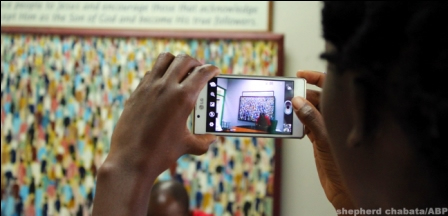A short interview with Tom Soper
In your last interview with Kubatana you were recovering from a serious, life altering accident. Share with us your hospital experience.
It was really terrifying particularly at the outset because I was supposedly unconscious for two weeks. But actually even though I was unconscious it was a different kind of consciousness. There were a lot of nightmares in it. It was a gradual awareness of the changes that were coming with physical disability. It was reshaping my life. This was an opportunity to come back with a different perspective on day-to-day activities, things I had taken for granted, getting back on the spiritual path and being able to inspire others.
Can you share with us what has inspired you lately, or what inspires you in general?
I am inspired by the sheer wonder of life. I am inspired by the night sky. I am inspired by the sheer extent of space and time. I am inspired by the infinite detail of what’s around us. I am inspired by people’s courage, goodness and potential. Some people who go about using their potential like yourselves at Kubatana; Bev and Amanda inspire me.
What are your views on the key ingredients for the future of a successful Zimbabwe?
With my background in finance the straightforward answer is that we need some liquidity in this economy. That basically means direct foreign investment. We do not have the industry that is adding value to create that internal ability to get back on track. If we are exporting one or two billion dollars of goods every year and importing 7 billion there is a gap there that needs to be filled with simple economics. That can be filled by direct foreign investment and therefore there should be a platform to attract that investment … which comes down to politics.
What advice would you give yourself if you were starting all over again?
The rules I work on now are the generic rules like no matter how bad things may seem, they could always be quite a lot worse for others. To get stuck in your own problems is really not helpful at all. If you sit back and look at your own problems and then think of other people’s problems they tend to get smaller quite quickly. So in terms of philosophy, nothing is permanent. If nothing is permanent, it means problems will go away, but it’s up to you to take note of how much you want to suffer until that point. It takes patience, strength and the knowledge that life is full of injustices.
The other advice I try and reflect on every morning is to try and not take too much for granted. Also to look at time and perspective; a Buddhist perspective that says the past is gone and you can’t change it leaves you with a clean slate of the present. A lot of people are caught up in the past and do not realise how much influence they really have over their way of being.
In your own view should anything be labeled wrong or right?
I think the question of right or wrong is quite subjective because society has set certain rules that say this is right or wrong which is a basis for the law and a moral system. But I think society has gone a little bit too far – in particular education and religious systems – they are not as flexible as they might be.
What is your present state of mind?
I am in a good space. I am developing the ability to take a step back and have a look around me without getting caught up in my distractions. Whilst I see things that may be painful, I am more okay with that, than I used to be. I wouldn’t say positive, but I would say open.
The renowned poet Seamus Heaney died recently. He wrote: “The way we are living, timorous or bold, will have been our life.” What comes up for you when you reflect on his words?
I think that for me, it comes down to deciding to live life in the moment. I know it’s a cliché as if there is no tomorrow! You can either be bold and go for things that you are passionate about, or you can live in a shell – thinking that it’s probably a safer place. When I heard those words they reminded me of the quote I have in my office, “Life begins at the outer edge of your comfort zone,” and I would equate that to the bold in the poem. That is really where life does begin; if you are not bold about looking for and accepting new things, you will probably reach your deathbed with quite a lot of regrets.










